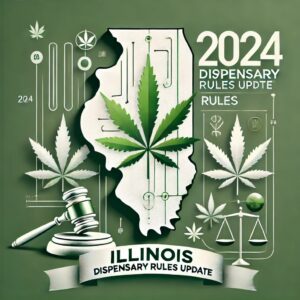
Are you an entrepreneur looking to start or operate a cannabis business in North Carolina? It’s important to stay informed about the state’s medical marijuana laws. In this blog post, we’ll cover everything you need to know, including qualifying conditions for medical marijuana, how to get a medical marijuana card, where to purchase medical marijuana, and the future of cannabis legislation in North Carolina. Stay tuned for expert insights and solutions regarding your journey into the world of medical cannabis entrepreneurship.
North Carolina Medical Marijuana Law
Marijuana is still illegal for recreational use in North Carolina. However, the state has legalized medical marijuana for patients with certain qualifying conditions. The North Carolina Medical Marijuana Act, also known as Senate Bill 711, was passed in June 2022 through both houses of the legislature.
The law allows patients with certain qualifying conditions to obtain a medical marijuana card from the North Carolina Department of Health and Human Services (DHHS). Patients with a medical marijuana card may purchase medical marijuana from a licensed dispensary. Medical Marijuana Centers may only sell medical marijuana to patients with a valid medical marijuana card.
How to Get a Medical Marijuana Card in North Carolina
Qualifications for a Medical Marijuana Card: To qualify for a medical marijuana card in North Carolina, you must be diagnosed with one of the qualifying conditions outlined by the state’s laws. The North Carolina Medical Marijuana Act lists 15 qualifying conditions for medical marijuana. These conditions include:
- Cancer
- HIV/AIDS
- Epilepsy
- Glaucoma
- Crohn’s disease
- Ulcerative colitis
- Debilitating Illness/Amyotrophic lateral sclerosis (ALS)
- Parkinson’s disease
- Multiple sclerosis
- Intractable pain
- Seizures
- Severe nausea
- Post-traumatic stress disorder (PTSD)
- Anxiety disorder
- Terminal illness
Medical Marijuana Application Process: The application process for a medical marijuana card in North Carolina involves submitting an application to the NC Department of Health and Human Services along with relevant medical records and documentation. Once reviewed and approved, you will receive your medical marijuana card.
Consulting with a Physician: Before applying for a medical marijuana card in North Carolina, it is necessary to consult with a physician who is registered with the state’s Medical Cannabis Program to confirm if you have any of the qualifying illnesses. During this consultation, the physician will evaluate your condition and determine if you meet the criteria for obtaining a medical marijuana card.
Please note that these paragraphs are not intended to be used together but rather as separate options that can fit under the sub-heading ‘How to Get a Medical Marijuana Card in North Carolina’.
Where to Purchase Medical Marijuana in North Carolina
Medical Marijuana Centers are the primary sources for purchasing medicinal marijuana in North Carolina. These establishments adhere to state regulations and offer a range of products that cater to different medical needs and purposes. Entrepreneurs looking to enter the cannabis industry should explore partnerships with these licensed entities for distribution opportunities.
Licensed dispensaries/Medical Marijuana Centers are the primary sources for purchasing medical marijuana in North Carolina. Entrepreneurs can explore distribution opportunities with these licensed entities. Online ordering options offer convenience, with products delivered directly to patients’ doorsteps while ensuring compliance with state laws. Delivery services bring medical marijuana directly to patients’ homes, making it more convenient for those facing mobility or transportation challenges throughout the state.
In addition to licensed dispensaries and pharmacies, online ordering options provide convenience for patients seeking medical marijuana in North Carolina. With a few clicks, individuals can browse through various products and have them delivered directly to their doorstep. This digital platform offers accessibility while ensuring compliance with state laws.
Delivery services further enhance accessibility by bringing medical marijuana directly to patients’ homes in North Carolina. This option eliminates the need for travel, making it more convenient for those who may face mobility or transportation challenges. Partnering with reputable delivery services can expand business reach and cater effectively to patient needs throughout the state.
Senate Bill 3
Senate Bill 3 would enact the North Carolina Compassionate Care Act to provide for the sale of cannabis and cannabis-infused products to qualified patients with a debilitating medical condition through a regulated medical cannabis supply system.
Under SB 3, a Compassionate Use Advisory Board would be established, and it could add new qualifying medical conditions.
The Medical Cannabis Production Commission (“Commission”) will be created and will be responsible for approving and regulating medical cannabis suppliers in the state.
Business Opportunity: License Application
The Medical Cannabis Production Commission will issue 10 medical cannabis supplier licenses, and each supplier will be allowed to operate no more than eight medical cannabis centers.
The Medical Cannabis Production Commission is directed to give priority to suppliers who commit to establishing a medical cannabis center in more than one Tier 1 county, or who commit to establishing medical cannabis centers in a manner that would ensure equitable distribution.
They will establish a seed-to-sale tracking system to monitor the movement of cannabis from cultivation to sale. This will help to ensure the safety and quality of medical cannabis products in the state.
How to Apply for a Medical Cannabis Supplier License?
- Applicants for a medical cannabis supplier license must submit specified information to the Commission including:
- Applicant’s name;
- Address of all production facilities and medical cannabis centers;
- Proposed Operating Procedures;
- Information on each principal officer/board member;
- Proof of sufficient assets to operate as a supplier
- Proof of being a State resident for at least two years and of being the majority owner;
Applicants must also pay a $50,000 nonrefundable fee, plus $5,000 for each production facility or medical cannabis center the applicant proposes to operate under the license. Applicants must also pay a nonrefundable renewal fee of no less than $10,000, plus $5,000 for each new production facility or medical cannabis center, plus $1,000 for each existing production facility or medical cannabis center.
A medical cannabis supplier license is valid for 12 months and may be renewed.
Note: A supplier must begin cultivation of cannabis within 120 days of receiving a license and begin selling cannabis and cannabis-infused products within 270 days of initiating cultivation.
What can a Medical Marijuana Licensed Supplier do?
A supplier is restricted to only selling cannabis or cannabis-infused products through a medical cannabis center the supplier is licensed to operate. The supplier may only sell cannabis grown by the supplier at production facilities. The supplier would be permitted to sell cannabis or cannabis-infused products for resale to another licensed supplier.
The Future of Medical Marijuana in North Carolina
Potential Legalization of Recreational Use:
As the movement to legalize recreational marijuana gains momentum across the country, North Carolina cannabis committee remains conservative in its stance. However, recent discussions and public opinion surveys suggest that attitudes towards recreational use are shifting. While no concrete steps have been taken yet, it is possible that North Carolina may consider legalizing recreational marijuana in the future but the lawmakers may make it highly regulated.
Expanding Access to Patients and Conditions Covered by the Program:
North Carolina’s medical marijuana program currently has a limited scope, with access restricted to only a handful of qualifying conditions. However, there are ongoing efforts to expand this list and provide greater access for patients in need. Advocacy groups continue to push for inclusion of additional conditions such as chronic pain and anxiety disorders, which could significantly broaden the program’s reach in the coming years.
Regulatory Developments:
In terms of regulatory developments surrounding medical marijuana laws, North Carolina has implemented stricter regulations aimed at ensuring safety and quality control within its existing program. This includes rigorous testing standards for products sold at licensed dispensaries and increased oversight over cultivation facilities. These developments demonstrate a commitment from state authorities to create an environment conducive for responsible cannabis businesses while prioritizing patient well-being.





